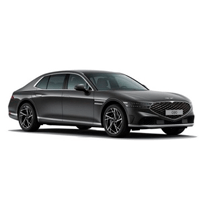
Catalog / Genesis
Genesis: Korean Luxury Redefining the Automotive Landscape
Genesis, the luxury vehicle division of South Korean automaker Hyundai Motor Group, has rapidly established itself as a formidable player in the premium car market. The brand's journey began in 2004 when Hyundai introduced the Genesis name as a luxury sedan model. However, it wasn't until November 4, 2015, that Genesis was officially launched as a standalone luxury brand, marking a significant milestone in the Korean automotive industry.
The creation of Genesis was driven by Hyundai's ambition to compete directly with established luxury car manufacturers from Europe, Japan, and the United States. This bold move was inspired by the success of Toyota's Lexus brand and aimed to elevate the perception of Korean automobiles in the global market.
Interesting fact: The Genesis logo, featuring wings within a shield, symbolizes the brand's aspiration for creativity and innovation. The emblem's design is said to be inspired by the DNA of automotive design, representing the brand's commitment to engineering excellence and distinctive style.
Genesis made its debut with the G90 flagship sedan, which was unveiled in December 2015. This full-size luxury car set the tone for the brand's design language and technological offerings. Following the G90, Genesis rapidly expanded its lineup with the introduction of the G80 mid-size sedan and the G70 compact executive sedan, the latter of which garnered significant acclaim, winning several Car of the Year awards globally.
In 2020, Genesis made a strategic move by entering the lucrative luxury SUV market with the launch of the GV80. This was quickly followed by the introduction of the GV70, a compact luxury SUV, further diversifying the brand's portfolio and appealing to a broader range of luxury car buyers.
One of the most significant developments in Genesis' history came in 2021 when the brand announced its commitment to electrification. Genesis revealed plans to phase out internal combustion engines and become an all-electric vehicle brand by 2030. This bold strategy aligns with global trends towards sustainable mobility and positions Genesis at the forefront of the luxury electric vehicle market.
The brand's design philosophy, dubbed 'Athletic Elegance,' has been a key differentiator in the luxury car segment. Led by a team of renowned designers, including Luc Donckerwolke (former designer for Bentley, Lamborghini, and Audi), Genesis has created a distinctive visual identity characterized by bold lines, signature two-line lighting elements, and a sophisticated yet modern aesthetic.
Genesis has also made waves with its innovative approach to the customer experience. The brand introduced the 'Genesis at Home' service, which brings the car-buying process directly to customers' homes, including test drives and vehicle delivery. This customer-centric approach has helped Genesis build a loyal following and challenge the traditional luxury car buying experience.
As of 2024, Genesis continues to expand its global presence, with a growing dealer network in key markets such as North America, Europe, China, and Australia. The brand has consistently earned high marks for quality and customer satisfaction, often outranking more established luxury marques in various industry surveys.
Looking to the future, Genesis is poised to play a significant role in the luxury electric vehicle market. With plans for a full lineup of electric vehicles and a commitment to sustainable luxury, Genesis is writing a new chapter in automotive history, proving that luxury and innovation can come from unexpected places. The brand's journey from a bold idea to a respected player in the global luxury car market serves as a testament to the rapid evolution of the automotive industry and the rising influence of Korean manufacturing and design on the world stage.







